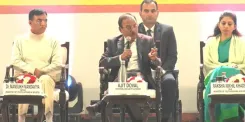What Major Discrepancies Did the Jharkhand HC Flag in the JSSC Merit List?

Synopsis
Key Takeaways
- Jharkhand High Court addresses discrepancies in JSSC merit list.
- Concerns over transparency and integrity raised.
- Higher-scoring candidates unfairly removed from the list.
- JSSC ordered to justify merit list criteria.
- Petitioners have valid claims regarding their scores and TET completion.
Ranchi, Nov 20 (NationPress) The Jharkhand High Court has taken action against the Jharkhand Staff Selection Commission (JSSC) for reported discrepancies in the revised results of the recruitment examination for Assistant Teachers in Mathematics and Science subjects.
In response to several complaints, the court expressed that these inconsistencies raised significant doubts regarding the transparency and integrity of the selection process.
The bench, led by Justice Ananda Sen, noted that evidence presented suggested that numerous candidates who achieved higher scores were unjustly removed from the revised merit list, while some candidates with lower scores remained.
The court requested that JSSC clarify the criteria, guidelines, and methods used in creating the revised merit list.
A petition brought forth by Kishore Kumar and other dissatisfied candidates argued that they were included in the preliminary results and subsequently invited for district-level counseling.
During counseling, candidates were shown their official scores, which the petitioners claim indicated their superior merit.
However, upon the announcement of revised results, many candidates with lower scores were retained, while those with higher scores, including the petitioners, were excluded.
Advocate Chanchal Jain, representing the petitioners, provided the court with 15 to 20 instances illustrating these discrepancies.
The petitioners also pointed out that they hold commendable scores in their respective categories and have successfully cleared the Teacher Eligibility Test (TET), making their exclusion even more perplexing.
The court expressed serious concern, instructing the commission to justify why candidates with lower marks were prioritized over those with higher scores.
Labeling the matter as “serious,” the High Court issued a temporary order directing that the positions related to the petitioners remain unfilled until the issue is resolved.
Furthermore, the court mandated JSSC to submit a comprehensive counter-affidavit detailing the reasoning and procedures that resulted in the exclusion of higher-scoring candidates from the revised merit list.










